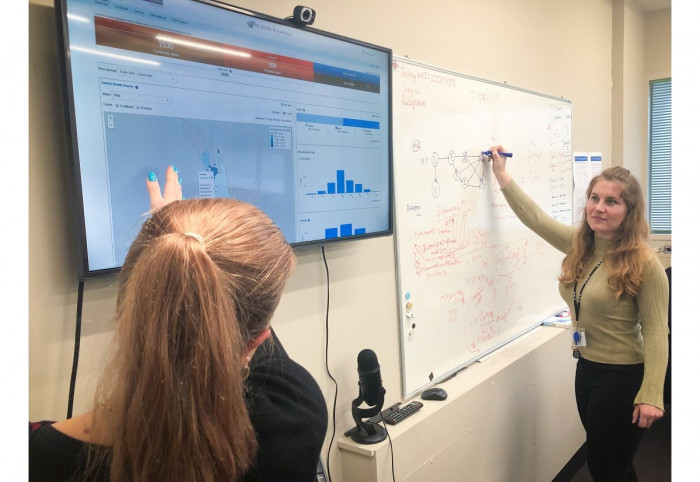Epidemiologist
Kaimātai Tahumaero
Alternative titles for this job
Epidemiologists study the causes, transmission and distribution of diseases in population groups to inform public health programmes and prevent the spread of disease.
Pay
New epidemiologists usually earn
$50K-$86K per year
Epidemiologists with experience usually earn
$75K–$175K per year
Source: Healthcare Salary Info, 2020.
Job opportunities
Pay
Pay for epidemiologists varies depending on skills, experience and their employer.
- Graduate epidemiologists usually start on $50,000 to $86,000 a year.
- Mid-level epidemiologists usually earn between $75,000 and $112,000.
- Senior epidemiologists who work as team leaders or managers can earn from $96,000 to $175,000.
Source: Healthcare Salary Info, 2020; and ESR, 2020.
(This information is a guide only. Find out more about the sources of our pay information)
What you will do
Epidemiologists may do some or all of the following:
- design and conduct observational or intervention studies or surveys to collect data
- analyse data to find the causes of diseases or who is at risk of a particular disease
- research trends in disease survivors and identify effective treatments
- communicate findings to health practitioners, policymakers and the public
- plan and evaluate public health programmes
- talk to the public about health risks and healthy living.
Epidemiologists also attend and present at national and international conferences and events, and publish research.
Skills and knowledge
Epidemiologists need to have knowledge of:
- diseases and how they affect groups of people
- maths and statistical methods
- using large databases and statistical software packages
- quantitative research skills including study design and data analysis.
Working conditions
Epidemiologists:
- usually work regular business hours, but may have to work long or irregular hours
- work in offices and laboratories, or in the community to support an emergency response
- may travel to do fieldwork, carry out surveys, collect samples or support community education.
What's the job really like?

Charlotte Gilkison
Epidemiologist
Epidemiology benefits the population
Epidemiologist Charlotte Gilkison says it was her interest in population health rather than the health of individuals that led her to study epidemiology.
“I was thinking of doing medicine, but saw the benefit to society with epidemiology."
She says COVID-19 is a perfect example. "I’m now providing the Ministry of Health with intelligence to get a better idea of who is most at risk. It involves analysing data on all cases that get notified, such as gender, age, symptoms and location."
Being responsive to new disease outbreaks
“There are always new and emerging diseases happening in New Zealand and around the world so you have to be ready to shift priorities," says Charlotte.
"But usually we’re responding to a variety of diseases, such as vaccine-preventable or foodborne diseases. Sometimes several outbreaks can happen at once, which is challenging, but it’s all about teamwork."
Growing interest in Pacific diseases
For her Masters in Public Health, Charlotte got the chance to work on a project with a university in the Netherlands. “I learned how to use a leprosy transmission model and adapt it for Kiribati, where leprosy has been increasing.
“I’m now interested in the Pacific, and the big dream is to work with the World Health Organisation on tropical diseases.”
Entry requirements
To become an epidemiologist you need to:
- complete a Bachelor’s degree in a biological or health science, or maths and statistics, and
- complete a Masters or PhD in public health, majoring in epidemiology.
Secondary education
A tertiary entrance qualification is required to enter further training. Useful subjects include maths, biology, chemistry, health, social studies, economics and digital technologies.
Personal requirements
Epidemiologists need to be:
good at teamwork- able to think critically and observe patterns in statistical data
- good communicators
- accurate and detail-focused.
Useful experience
Useful experience for epidemiologists includes:
- working with a large amount of data
- experience in the health industry
- experience in a statistics-related role
- work on an epidemiological project.
Registration
Employers prefer epidemiologists to be registered with the International Epidemiological Association.
Find out more about training
- Institute of Environmental Science & Research (ESR)
- enquiries@esr.cri.nz - www.esr.cri.nz
- Massey University of Wellington
- 0800 627 739 - contact@massey.ac.nz - www.massey.ac.nz
- University of Auckland
- 0800 616 263 - www.auckland.ac.nz
- University of Otago
- 0800 808 098 - university@otago.ac.nz - www.otago.ac.nz
What are the chances of getting a job?
Disease prevention focus creating demand for epidemiologists
Demand for epidemiologists is expected to increase because of a growing focus on reducing the risk of ill health and disease in the New Zealand population.
It is recognised that health inequalities contribute to chronic (long-term) disease, and by analysing health data of specific groups, epidemiologists enable targeted health interventions.
COVID-19 highlights epidemiology
As epidemiologists have played a significant role in helping control the COVID-19 outbreak, demand for epidemiologists is likely to continue.
Through Budget 2020 and the COVID Response and Recovery Fund the Government is investing over $400 million in science and innovation over four years. This is expected to create further opportunities for epidemiologists.
The funding will assist epidemiologists working in other areas including:
- water and environmental monitoring
- food safety
- new foods
- vaccines (for diseases other than COVID-19)
- biofuel production.
Applied public health experience valuable
The expanding number of public health Master’s degree programmes has led to more graduates with epidemiology qualifications and more competition for jobs in some areas.
However, experience in an applied public health setting, for example at the Ministry of Health or a public health unit, will allow you to gain analytical skills valued by many employers.
Types of employers varied
Epidemiologists may work for:
- public health units
- the Ministry of Health
- Crown research institutes (CRIs)
- universities
- medical and veterinary laboratories
- hospitals
- commercial science laboratories
- private research institutes.
Sources
- Hill, P, professor, Department of Public Health, University of Otago, careers.govt.nz interview, May 2020.
- Ministry of Business, Innovation & Employment, ‘Occupation Outlook, Scientists’, accessed September 2020,(www.occupationoutlook.mbie.govt.nz).
- New Zealand Herald, ‘Budget 2020: Scientists welcome modest bump for sector’, 14 May 2020, (www.nzherald.co.nz).
(This information is a guide only. Find out more about the sources of our job opportunities information)
Progression and specialisations
Epidemiologists may progress to senior positions or project leadership, or move into research roles.
Epidemiologists may specialise in:
- infectious diseases
- chronic diseases
- maternal and child health
- public health preparedness and emergency response
- environmental health
- injury
- occupational health
- oral health.
Last updated 31 May 2021


